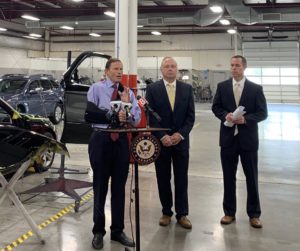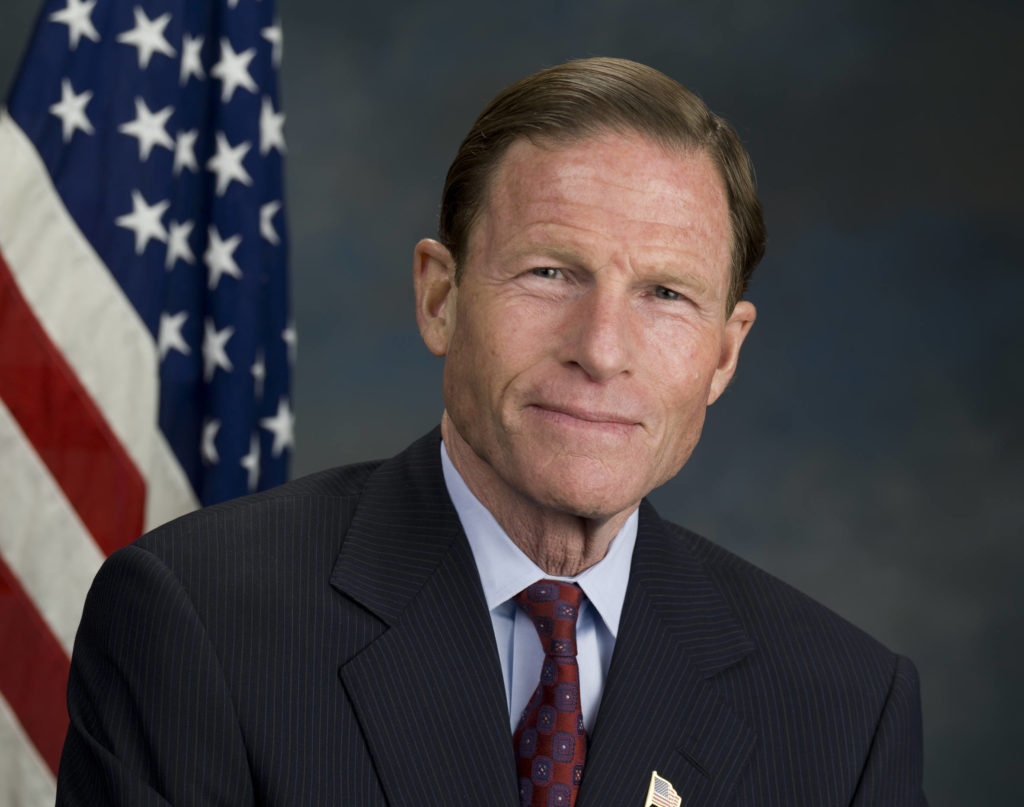
Conn. Sen. Blumenthal joins shops demanding 1963 Consent Decree preservation
By onAnnouncements | Associations | Business Practices | Insurance | Legal | Repair Operations
Collision repair industry representatives and a U.S. senator Monday called on the U.S. Justice Department to retain the 1963 Consent Decree between the government and insurance trade groups.
“There is a basic principle here. Your car, your choice,” U.S. Sen. Richard Blumenthal, D-Conn., said at a news conference. He said he would discuss the issue with his colleagues.
The DOJ this month proposed terminating the agreement as part of a 2018 initiative to eliminate some of the nearly 1,300 “legacy” antitrust judgments enacted without sunset dates. Starting in 1979, the government’s policy has been to include an automatic end date — usually 10 years — regarding antitrust judgments.
“Differences in parts & installation can pinch pocketbooks & imperil safety,” Blumenthal wrote on Twitter on Monday. “Consumers should not be coerced or directed to car repair shops that have sweetheart deals with the insurer. This proposed DOJ action would turn back the clock on automotive consumer protections.”
Collision repairers, insurers and other interested parties had a deadline of Sept. 2 to provide public comment on the government’s proposal. Comments should be directed to JudgmentTerminationComments@usdoj.gov and in the subject line include the case name (U.S. v. Association of Casualty and Surety Companies, et al) and docket number (63 Civ. 3106).
However, the DOJ on Wednesday said it would provide another 30 days beyond Sept. 2 for comment.
Blumenthal on Monday had called it “noteworthy” that the DOJ was taking comments in the “dog days” of summer, while people are busy or on vacation. This disadvantaged auto body trade groups, he said.
“Very bluntly,” Blumenthal said, the agency was doing the bidding of insurance carriers. It gave that industry back an edge over consumers, he said.
“The Antitrust Division will be providing an additional 30 day period for public comments given the Senator’s concern,” a DOJ spokesman said Wednesday when asked if the agency wished to respond to Blumenthal’s comments.
In 2018, the agency said it put each “legacy” judgment in the hands of an attorney, “who will examine court papers, internal case files, and publicly available information to determine whether each judgment continues to serve competition.”
The DOJ on March 26 said many of the sunsetless judgments “no longer serve the interests of competition.”
“These include judgments that (1) prohibit already-illegal conduct (e.g., price fixing and market allocation), (2) cover industries in which relevant circumstances have changed, and (3) bind defendants who are no longer operating in the relevant line of commerce,” it continued.
We also asked the DOJ about its specific rationale for proposing the consent decree for the chopping block; a response is expected Thursday.
Blumenthal appeared Monday with Auto Body Association of Connecticut President Bob Amendola (Autoworks of Westville, New Haven), board member Tony Cavallaro Jr. (Airport Road Auto Body) and attorney John Parese (Buckley Wynn & Parese). The trade group has opposed the DOJ’s plan.
Amendola said the 1963 Consent Decree hasn’t been enforced as well as it should be.
“That’s not even good enough that they’re ignoring the law; they want it repealed,” he said.
Differences in parts & installation can pinch pocketbooks & imperil safety. Consumers should not be coerced or directed to car repair shops that have sweetheart deals with the insurer. This proposed DOJ action would turn back the clock on automotive consumer protections. pic.twitter.com/E75OvBGKRM
— Richard Blumenthal (@SenBlumenthal) August 19, 2019
Consent Decree
The 1963 consent decree settled a number of DOJ antitrust allegations with the Association of Casualty and Surety Companies, American Mutual Insurance Alliance and National Association of Mutual Casualty Companies.
The Association of Casualty and Surety Companies later was merged into the American Insurance Association, which merged with the Property Casualty Insurers Association of America effective Jan. 1 to create today’s American Property Casualty Insurance Association.
The 1963 agreement held that there had been no “admission by any party with respect to any issue herein.” It was ”binding upon each defendant and upon its officers, directors, agents, servants, employees, committees, successors and assigns, and upon all other persons in active concert or participation with any defendant who shall have received actual notice of this Final Judgment by personal service or otherwise.”
According to an I-CAN copy of the 1963 complaint settled by the decree, insurers were alleged to have since about 1947 “engaged in a combination and conspiracy in unreasonable restraint of the aforesaid trade and commerce in the adjustment and settlement of automobile property insurance claims, the automobile material damage appraisal business and the automobile damage repair business, in violation of Sections 1 and 3 of the Sherman Act. Defendants are continuing and will continue said offenses unless the relief herein prayed for is granted.”
The complaint continued:
The aforesaid combination and conspiracy has consisted of a continuing agreement and concert of action among the defendants and co-conspirators to eliminate competition among member companies in the adjustment and settlement of automobile property insurance claims, among appraisers and among repair shops, in order to control and depress automobile material damage repair costs through boycott, coercion and intimidation of repair shops.
Pursuant to and in effectuation of the aforesaid combination and conspiracy the defendants and co-conspirators did those things which, as hereinbefore alleged, they agreed to do and, among others, did the following things: (a) Refused to recognize or sponsor more than one appraiser in a territory designated by a Council or the CCC; (b) Coerced sponsored appraisers to operate only in the territories in which they are sponsored; (c Induced member companies to channel their automobile material damage appraisal business to the sponsored appraiser and boycott other business to the sponsored appraiser and boycott other automobile material damage appraisal businesses; (d) Encouraged the use of sponsored appraisers by others to increase the effectiveness of the Plan; (e) Required sponsored appraisers to conform their operations to the Plan and withdrew or threatened to withdraw the sponsorship of appraisers who failed to do so; (f) Required fees charged by sponsored appraisers to be approved by Councils or the CCC; (g) Induced member companies to refuse to settle a claim for an amount greater than a sponsored appraiser’s estimate of the automobile material damage repair costs; and (h) Induced member companies to channel automobile material damage repair business to those repair shops which will, and boycott those repair shops which will not: (1) Accept the sponsored appraiser’s estimate as to the cost of repairs; (2) Give a price discount on replacement parts; (3) Maintain hourly labor rates at a figure which is considered the lowest possible rate in the area; and (4) Accede to the sponsored appraiser’s determination of time allowances.
The three trade groups under the decree were ordered to end the “Independent Appraisal Plan, sometimes known as the Automotive Damage Appraisal Plan.”
They also were prohibited from enacting “any plan, program or practice” intended to or creating the effect of:
(1) sponsoring, endorsing or otherwise recommending any appraiser of damage to automotive vehicles;
(2) directing, advising or otherwise suggesting that any person or firm do business or refuse to do business with (a) any appraiser of damage to automotive vehicles with respect to the appraisal of such damage, or (b) any independent or dealer franchised automotive repair shop with respect to the repair of damage to automotive vehicles;
(3) exercising any control over the activities of any appraiser of damage to automotive vehicles;
(4) allocating or dividing customers, territories, markets or business among any appraisers of damage to automotive vehicles; or
(5) fixing, establishing, maintaining or otherwise controlling the prices to be paid for the appraisal of damage to automotive vehicles, or to be charged by independent or dealer franchised automotive repair shops for the repair of damage to automotive vehicles or for replacement parts or labor in connection therewith, whether by coercion, boycott or intimidation or by the use of flat rate or parts manuals or otherwise.
‘Important beacon’
“This is an issue that touches every auto body repair shop across the entire country,” said Parese, who said he spoke Monday on behalf of the Society of Collision Repair Specialists and ABAC.
Parese on Monday said he represented ABAC and licensed repairer facilities nationwide in saying, “We unanimously want to save this consent decree. We do not want it vacated.”
Parese said repairers in 48 out of 50 states have joined ABAC in attempting to get the law enforced — not eliminated.
“There is no basis for vacating this law right now,” he said.
He called the consent decree “a guiding light” to hold that efforts to suppress market conditions or allow insurers to dictate repairs should be prohibited, not encouraged. It isn’t necessarily a “direct statute, for example,” but it was a “guiding principle” for class-action lawsuits and legislative efforts.
He called it an “important beacon, if you will.”
Anticompetitive practices from 1963 occur today, Parese said. “We need to enforce that law, not vacate it,” he said.
Parese said that at the end of the day, they wanted insurers underwriting risks and shops “left to fix vehicles.” Insurer involvement in the repair process meant “everyone suffers” except for carriers that “reap undue profits.”
Technology and systems within vehicles means “you cannot fix cars on the cheap,” he said.
Be heard: Comment on the proposal at JudgmentTerminationComments@usdoj.gov with a subject line including the case name (U.S. v. Association of Casualty and Surety Companies, et al) and docket number (63 Civ. 3106).
More information:
Department of Justice judgment termination initative portal
U.S. v. Association of Casualty and Surety Companies, et al decree on DOJ termination portal
SCRS prepared comments for 1963 Consent Decree news conference
Society of Collision Repair Specialists, Aug. 19, 2019
Auto Body Association of Connecticut public comments to DOJ
ABAC, Aug. 16, 2019
Images:
U.S. Sen. Richard Blumenthal, D-Conn. (Provided by the Office of U.S. Sen. Richard Blumenthal)
From left, U.S. Sen. Richard Blumenthal, D-Conn., appeared Aug. 19 with Auto Body Association of Connecticut President Bob Amendola (Autoworks of Westville, New Haven) and attorney John Parese (Buckley Wynn & Parese) to oppose the Department of Justice plan to end the 1963 Consent Decree. (Provided by the Office of U.S. Sen. Richard Blumenthal)

